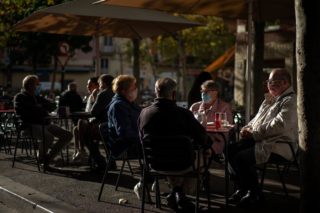
Gathering for Friday prayers at a mosque in Islamabad, Pakistan, in April.Credit…Saiyna Bashir for The New York Times
Every morning before dawn for the past few weeks, Yasser al-Samak, a Bahraini man, has roamed the streets in his village outside Manama, the capital, waking his neighbors for the predawn suhoor meal that observant Muslims eat during the holy month of Ramadan before their daylong fast.
“Stay home with your family, and blend your suhoor with hope, because those who rely on God, he will protect them,” he sings, according to Agence France-Presse. “Make yourself strong with prayer and wear the mask as a shield against the pandemic.”
In villages and cities around the Middle East, some “Ramadan drummers” still keep alive a tradition that in recent years has given way to alarm clocks and smartphone alerts. But under the coronavirus cloud, almost everything else about Ramadan — and the usually joyful holiday that marks its end, Eid al-Fitr, which begins this weekend — has been new, and not in a good way.
As a nod to the holy month, and in part because Covid-19 caseloads seemed to be lightening, several Arab countries slightly relaxed restrictions on gathering and commerce — only to clamp down again as cases suddenly mounted.
The Eid holiday will pose a sharp challenge to the authorities: Instead of taking part in communal prayer, feasts and parties, many people in the Middle East and across the Muslim world will be more confined than they have been in weeks.
Saudi Arabia has announced a 24-hour curfew from Saturday through Wednesday, covering the entire holiday period. Omani authorities have banned all Eid gatherings, saying that residents have still been meeting in groups in defiance of social-distancing orders. Qatar has suspended all but a few business activities during Eid. The United Arab Emirates is shifting its nightly curfew earlier.
Egypt, which never shut down its economy to the extent that other countries in the region did, is also tightening up for Eid. The national curfew will be moved up four hours to 5 p.m.; restaurants, cafes, beaches and parks will be closed.
As for prayers, the religious authorities in Egypt and Saudi Arabia have ruled that they should be performed at home.
The New York Times




